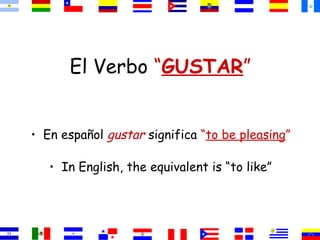
Module 5 gustar
- 1. El Verbo “GUSTAR” • En español gustar significa “to be pleasing” • In English, the equivalent is “to like”
- 2. Por ejemplo: • In English we say: “I like Spanish.” • En español decimos: “To me, Spanish is pleasing.”
- 3. I like the beach. beach In English: En español: • “I” is the subject • “the beach” is the subject • “like” is the verb • “to please” is the • “the beach” is the verb direct object • “me” is the indirect object
- 4. En Español…: The word order is actually “backwards”: • The indirect object comes first: Me • Then the verb: gusta • Finally the subject of the verb: la playa. • Make it negative by adding “no” at the beginning.
- 5. Who is doing the “liking”? Indirect Object Pronouns: me nos te os le les
- 6. “Gusta” = singular nouns = infinitives “Gustan” = plural nouns
- 7. Frases de clarificación: He likes to swim. “Le gusta nadar.” She likes to swim. You like to swim. They like the beach. “Les gusta la playa.” You like the beach.
- 8. Frases de clarificación: Me = a mí Nos = a nosotros Te = a ti Os = a vosotros Le = a él Les = a ellos a ella a ellas a Ud. a Uds. (a Roberto) (a Roberto y (a Lola) a Luis) (a tu hermano) (a Lola y a Carmen) (a mis amigos)
- 9. Me gusta… / Me gustan… I like… Te gusta… / Te gustan… You like… Le gusta… / Le gustan… He / she / You like(s)… = Nos gusta… / Nos gustan… We like… Os gusta… / Os gustan… You guys like… Les gusta… / Les gustan… They / you like…
- 10. ¿Cómo se dice? “I like coffee.” Me gusta el café. “Coffee is pleasing to me.”
- 11. ¿Cómo se dice? “You like cars.” Te gustan los coches. “Cars are pleasing to you.”
- 12. ¿Cómo se dice? “He doesn’t like to dance.” No le gusta bailar. “To dance is not pleasing to him.”
- 13. ¿Cómo se dice? “We like our teachers.” Nos gustan nuestros profesores. “Our teachers please us.”
- 14. ¿Cómo se dice? “You (guys) don’t like to go to the movies.” No os gusta ir al cine. “To go to the movies is not pleasing to you (guys).”
- 15. ¿Cómo se dice? “They like history and spanish.” Les gustan la historia y el español. “History and Spanish are pleasing to them.”
- 16. ¿Cómo se dice en español? I like to study. Me gusta estudiar. Elena likes to watch television. (A Elena) le gusta ver la televisión. We don’t like to do homework. No nos gusta hacer la tarea. Carlos and Miguel like cars. (A Carlos y a Miguel) les gustan los coches. Do you guys like to look at photos? ¿Os gusta mirar fotos? You like to go shopping, right? Te gusta ir de compras, ¿verdad?